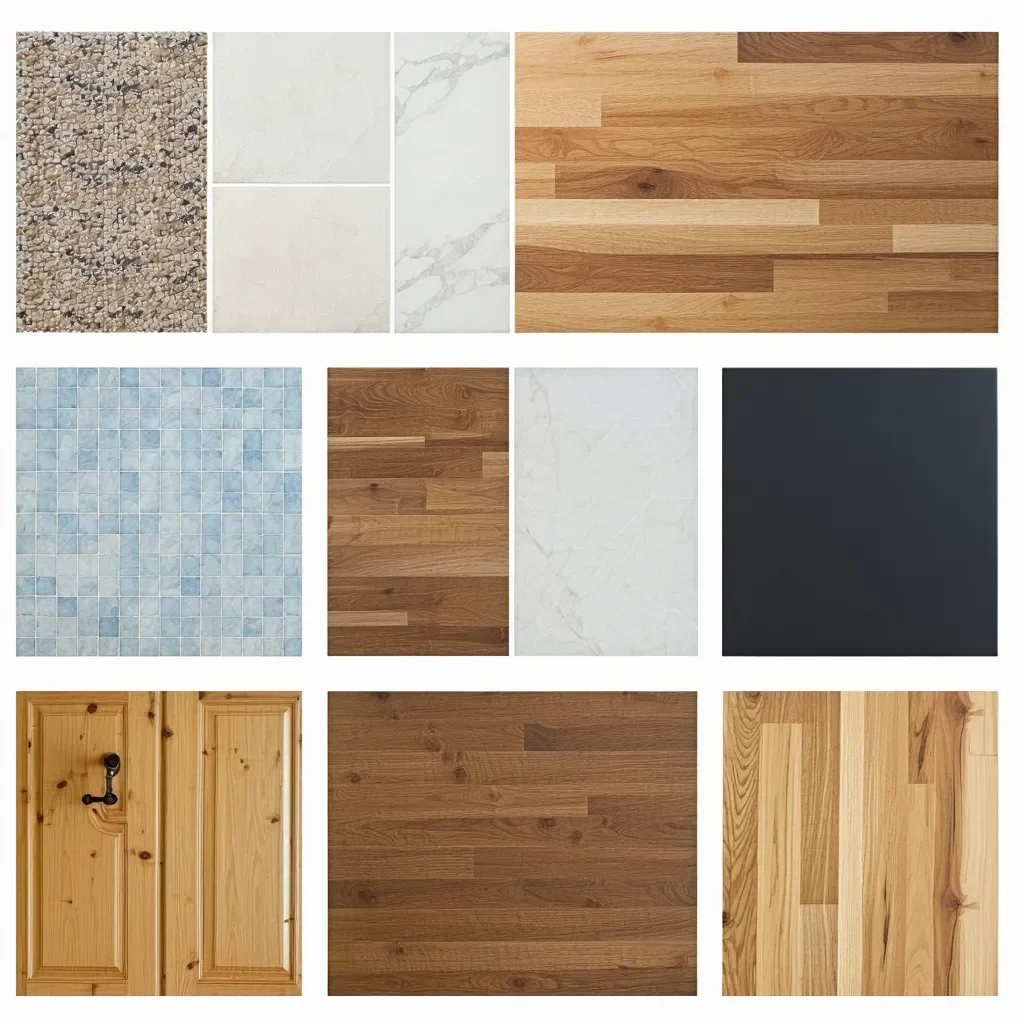Kitchen Flooring Remodel Options: Pros & Cons

How Kitchen Flooring Shapes a Stylish, Functional KitchenThe Foundation of a Stylish and Functional Kitchen starts with Kitchen Flooring
Your kitchen floor endures more wear and tear than any other surface in your home. From morning coffee spills and dinner prep splashes to the constant foot traffic of family gatherings, your kitchen flooring must perform under pressure while maintaining its beauty. With countless materials, finishes, and price points available, selecting the right flooring can feel overwhelming—but it’s also one of the most impactful decisions you’ll make during your kitchen remodel.
When remodeling your kitchen, flooring plays a critical role in setting the tone for the space. It must be durable enough to handle spills, heat, and heavy traffic—yet stylish enough to complement your cabinetry and overall design.
In this guide, we break down the most popular kitchen flooring options and the pros and cons of each to help you make an informed decision based on lifestyle, budget, and aesthetic preferences.
Porcelain or Ceramic Tile
Pros:
- Extremely durable and resistant to water, stains, and scratches.
- Available in countless styles, colors, and textures.
- Easy to clean and maintain.
Cons:
- Cold and hard underfoot, which can be uncomfortable during long cooking sessions.
- Grout linesrequire maintenance.
- Can be slippery when wet unless textured or matte-finished.
Best for:Homes in hot climates, high-traffic kitchens, and designs seeking a sleek or traditional look.
Hardwood Kitchen Flooring
Pros:
- Timeless and adds warmth and character.
- Increases resale value.
- Can be refinished multiple times to restore appearance.
Cons:
- Susceptible to water damage if not properly sealed.
- Scratches more easily than other surfaces.
- Requires regular maintenance to retain its beauty.
Best for:Open-concept kitchens and those who want natural, classic appeal with long-term value.
Engineered Wood
Pros:
- Looks like real hardwood but with more moisture resistance.
- More dimensionally stable than solid wood.
- Easier and more flexible to install.
Cons:
- Still sensitive to prolonged moisture
- Limited refinishing potential compared to solid hardwood.
Best for:Homeowners who want the look of hardwood with improved durability.
Luxury Vinyl Plank (LVP) and Tile (LVT): What’s best for Kitchen Flooring
Pros:
- Highly water-resistant or waterproof.
- Affordable and easy to install.
- Offers realistic wood or stone visuals.
- Soft underfoot and quiet.
Cons:
- Lower resale value than natural materials.
- May fade or scratch over time, depending on quality.
Best for:Busy households, families with kids or pets, and budget-friendly remodels.
Laminate Kitchen Flooring
Pros:
- Budget-friendlywith a wide range of design options.
- Scratch-resistant and fairly easy to maintain.
- Quick installation.m
Cons:
- Not water-resistant—spills must be cleaned immediately.
- Can feel hollow or synthetic underfoot.
Best for:Lower-traffic kitchens or temporary remodels on a tight budget.
Natural Stone (Slate, Travertine, Marble)
Pros:
- High-end look that boosts home value.
- Unique patterns and tones in every tile.
- Extremely durable with proper care.
Cons:
- Porous—requires sealing and maintenance.
- Expensive to buy and install.
- Cold and hard underfoot.
Best for:Luxury kitchens, Mediterranean or rustic designs, and homeowners willing to maintain premium materials.
Cork Kitchen Flooring
Pros:
- Soft, warm, and comfortable to stand on.
- Eco-friendly and renewable.
- Naturally resistant to mold and mildew.
Cons:
- Susceptible to scratches and dents.
- Requires sealing to resist moisture.
- Limited style options.
Best for:Eco-conscious homeowners or those who spend a lot of time standing in the kitchen.
Concrete Kitchen Flooring
Pros:
- Extremely durable and modern in appearance.
- Customizable with stains, textures, and finishes.
- Great thermal mass for radiant heating systems.
Cons:
- Hard and unforgiving surface.
- Prone to cracking over time.
- Requires professional finishing.
Best for:Contemporary kitchens or industrial-style designs.
Making the Right Kitchen Flooring Choice for Your Home
Choosing the perfect kitchen flooring doesn’t have to be overwhelming when you understand your priorities and lifestyle needs. Whether you value the timeless elegance of hardwood, the practical durability of porcelain tile, or the budget-friendly versatility of luxury vinyl, each material offers distinct advantages for different households. The key is balancing your aesthetic preferences with practical considerations like maintenance requirements, moisture resistance, and long-term value. Remember that kitchen flooring is an investment that impacts both your daily comfort and your home’s resale potential. Take time to evaluate your cooking habits, family lifestyle, and design goals before making this important decision. With proper planning and professional installation, your chosen flooring will serve as the beautiful, functional foundation your kitchen deserves for years to come.
Ready to Transform Your Home?
At Mazzamuto Construction, we believe great spaces start with thoughtful planning and skilled craftsmanship. Whether you’re exploring ideas or ready to build, our team is here to guide you every step of the way. Let’s bring your vision home—reach outfor a personalized consultation today!
Frequently Asked Questions (FAQ)
What is the most durable kitchen flooring?
Porcelain or ceramic tile is considered the most durable and water-resistant option for kitchens. This kitchen flooring choice can withstand decades of heavy use without showing significant wear or requiring replacement.
2. Is hardwood flooring a good choice for kitchens?
Yes, but only if it’s properly sealed and maintained. Engineered wood offers a more moisture-tolerant alternative. When considering kitchen flooring materials, hardwood remains a popular choice for its natural beauty and ability to increase home value.
3. What flooring is best for resale value?
Hardwood and natural stone tend to offer the best return on investment, followed by high-quality tile. These premium kitchen flooring options appeal to most buyers and can significantly boost your home’s marketability.
4. What’s the easiest kitchen floor to maintain?
Luxury vinyl and ceramic tile are low-maintenance and easy to clean, making them ideal for busy households. These kitchen flooring materials require minimal upkeep while still delivering excellent performance and style.
5. Can I install kitchen flooring myself?
Some options, like vinyl plank and laminate, are DIY-friendly. Others, like tile and stone, require professional installation. Choosing the right kitchen flooring installation method depends on your skill level and the complexity of your chosen material.
Key Takeaways
- Flooring plays a critical role in both the function and style of your kitchen remodel.
- Porcelain tile and LVP are top choices for durability and water resistance.
- Hardwood offers timeless appeal but requires careful upkeep.
- Budget, foot traffic, and lifestyle should guide your flooring decision.
- Work with professionalsto ensure proper installation and long-term satisfaction.




